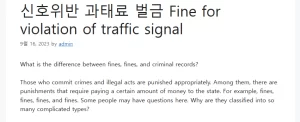What is the difference between fines, fines, and criminal records?
Those who commit crimes and illegal acts are punished appropriately. Among them, there are punishments that require paying a certain amount of money to the state. For example, fines, fines, fines, and fines. Some people may have questions here. Why are they classified into so many complicated types?
So today, we would like to find out the differences between these punishments. If you read this article, you will understand why the distinction is made in such detail. If you are in a related situation, please read it carefully, and even if you are not, it may be common sense, so take it easy. 신호위반 과태료 벌금

1. Fines and fines LOTUSSERENITY
A fine is a punishment that imposes and collects money for a violation of order under the Administrative Act. It is a form of punishment that is familiar to the general public because it can be imposed even when the level of violation of the law is quite minor. In fact, fines are imposed for things that can happen at least once in everyday life, such as smoking in a non-smoking place, jaywalking, violating a red light or speeding while driving.
At this time, there is a penalty with a similar concept. You can think of this as a punishment for violating the Road Traffic Act. If the driver who violated the law can be identified, a fine will be imposed. If not, a fine will be imposed. You can understand that a fine is usually imposed if a driver is caught directly by police, and a fine is imposed if the driver is not clearly visible because the driver is caught by a camera.
Additionally, no additional punishment will be imposed if fines are not paid on time. However, please note that additional fees may be imposed or seizure may occur.
2. What is a fine?
Unlike administrative fines, fines are imposed as judicial punishment. By law, this is done in cases where a misdemeanor has been committed. For example, urinating in the open, making a fuss after drinking, or illegally dumping trash. However, even if such an act is actually committed, it is generally the case that it ends at the level of a fine rather than a fine.
Legally, the fine is between 2,000 won and less than 50,000 won. Unlike fines, if payment is not made on time, labor must be performed for a period of at least 1 day but less than 30 days. However, please note that even though it is a punishment based on criminal law, there is no criminal record left, so there is no damage to your personal identity.
3. What is a fine?
Unlike how we usually use the word fine, the fine referred to in criminal law is a fairly heavy punishment. In fact, it is the most severe punishment other than imprisonment or imprisonment in a prison or detention center.
Unlike fines, fines, and fines, fines leave behind a criminal record, which can interfere with one’s social life in the future. Moreover, if you are unable to pay the fine, you will be imprisoned in a prison or detention center and have to do hard labor for up to three years, so it is not a light punishment at all.
Today, we learned about fines, penalties, fines, and fines, which are punishments in the form of paying money. It is an ambiguous concept until you understand it properly, but as you can see if you read it slowly, it is a concept that clearly needs to be distinguished. Of course, in reality, there are many cases where all types of fines are simply referred to as fines. However, if you read this article today, you may be more careful in choosing terms, so I hope that alone will be of help to you.